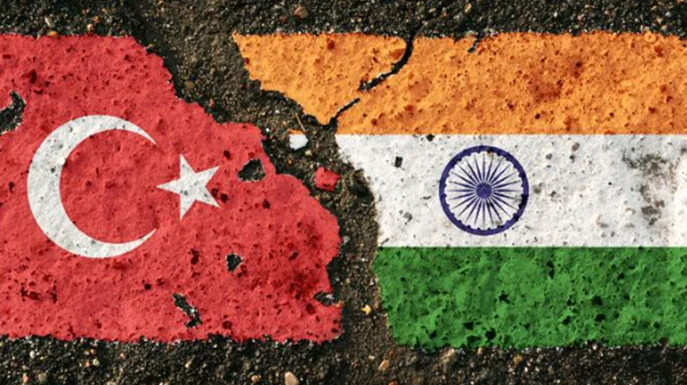India’s comprehensive boycott of Turkish goods and services poses a significant threat to Turkey’s fragile economy. In retaliation for Turkey’s military support to Pakistan during Operation Sindoor, India is expected to cost Turkey billions in lost revenue across various sectors, including tourism, trade, and government contracts. The immediate effects are already visible through booking cancellations and contract terminations. Given Turkey’s existing vulnerabilities, such as low currency value and high inflation, these losses could worsen its financial crisis and limit access to a rapidly growing Asian market.
Background and Context of the Economic Dispute
The economic confrontation between India and Turkey stems from Turkey’s involvement in the India-Pakistan conflict during Operation Sindoor, where President Erdogan allegedly provided Pakistan with over 350 drones and military support. This intervention is perceived by India as a threat to national security, leading to public outrage and businesses severing ties with Turkey. This economic backlash is especially detrimental for Turkey, which is already grappling with a low lira and high inflation, as losing the Indian market could hinder its economic recovery.
Tourism Sector Devastation
The tourism sector in Turkey is facing significant economic losses, particularly from Indian tourists, who contributed about $350-400 million in 2024. Due to a boycott, bookings from India have dropped by 60%, and cancellations have surged by over 250%. Companies like ixigo have suspended all flights and hotel reservations, while MakeMyTrip has reported a similar decline in bookings. Indian travel agents note a growing reluctance among customers to visit Turkey, fearing that tourism spending supports hostile actions against India. Although no formal advisory has been issued, government sources indicate that concerns over arms transfers to Pakistan are influencing this avoidance, suggesting a potential prolonged tourism boycott and lasting revenue losses for Turkey’s hospitality sector.
Trade and Commercial Contract Terminations
The trade relationship between India and Turkey is becoming strained, with India’s imports from Turkey reaching USD 3.78 billion in 2023-24. A significant USD 2.3 billion shipbuilding deal was cancelled by India, adversely affecting Turkish companies.
Concerns over national security led to the exclusion of Turkish businesses like Celebi Aviation, which had its security clearance revoked. Celebi plans to seek remedies for the operational disruptions that will follow.
Furthermore, the Carpet Export Promotion Council (CEPC) is pushing for higher tariffs on Turkish machine-made carpets. India’s current 20% customs duty contrasts sharply with Turkey’s 46% duty on Indian products, resulting in a decline of Indian carpet exports to Turkey from $17.08 million in 2015-16 to an expected $6.5 million in 2024-25.
Government Relations and Institutional Disruptions
The boycott has impacted Turkey’s academic and institutional ties, leading to economic losses. Notable Indian universities, such as Jawaharlal Nehru University and Jamia Millia Islamia, have suspended collaborations with Turkish institutions, limiting educational exchange revenues and Turkey’s influence in India’s academic sector.
Additionally, Turkish contractors are being systematically replaced in public works and other services by local or international firms, indicating a strategy to diminish reliance on Turkish entities.
This diplomatic strain may hinder future economic cooperation, as the Ministry of External Affairs has urged Turkey to take significant action against Pakistan’s cross-border terrorism support. Economic normalisation could depend on Turkey’s foreign policy changes, particularly regarding Pakistan.
Broader Economic Implications and Market Access
The economic losses from the Indian boycott are exacerbated by Turkey’s existing vulnerabilities, including currency devaluation, inflation, and reduced foreign investment. Turkey relies heavily on access to India’s market, which is vital for diversifying economic partnerships and securing foreign exchange. In 2023, Turkey exported $3.28 billion to India, while India exported $8.02 billion to Turkey, highlighting a trade imbalance that makes Indian market access more valuable to Turkey.
The boycott impacts key Turkish exports, such as crude petroleum, marble, and gold, resulting in substantial revenue losses. Additionally, the timing of the boycott is critical, as Turkey needs foreign exchange earnings due to the lira’s depreciation. Indian tourism and imports have been essential for Turkey’s balance of payments, and losing these streams could worsen currency pressures.
Grassroots support for the boycott is evident, as trade associations like the Confederation of All India Traders (CAIT) have independently reduced engagement with Turkish entities. This broad support suggests the boycott may persist even if diplomatic relations improve, as rebuilding trust will take time.
Conclusion
Turkey is facing significant economic losses due to India’s comprehensive boycott following Operation Sindoor, affecting tourism, trade, government contracts, and institutional ties. Immediate impacts include hundreds of millions in lost tourism revenue, termination of a $2.3 billion shipbuilding contract, and exclusion of Turkish companies from Indian markets. Given Turkey’s vulnerabilities, like high inflation and currency devaluation, these losses could worsen the financial crisis.
The boycott’s widespread nature suggests that economic normalisation may require Turkey to fundamentally change its foreign policy, especially regarding Pakistan. Turkey risks losing more from reduced ties, while India’s larger economy can better absorb the disruption, limiting Turkey’s access to a fast-growing market and future economic opportunities necessary for recovery.

